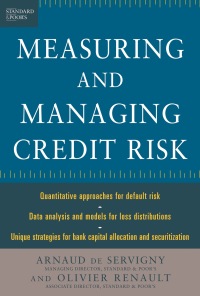Question
Morgan Steel has announced the introduction of a new product. They forecast product-specific sales demand to last five years. Then because this product is somewhat
Morgan Steel has announced the introduction of a new product. They forecast product-specific sales demand to last five years. Then because this product is somewhat of a fad, they will terminate the project. Manufacturing of the product will require the acquisition of an existing facility and purchase and installation of some new equipment. The following information describes the new project:
Capital Investment requirement:
Cost of new plant and equipment: $10,750,000
Shipping and installation costs: $ 525,000
Working Capital Requirements:
An initial working-capital requirement of $450,000 will accompany the start of production. After that, total investment in net working capital during each year will be equal to 15 percent of the dollar value of sales for that year. Therefore, the working capital investment required will increase during years 1 through 3, decrease in year 4, and, all working capital will revert to cash at the termination of the project at year end 5.
Sales Forecast:
| Year | Units Sold |
| 1 | 55,000 |
| 2 | 115,000 |
| 3 | 195,000 |
| 4 | 85,000 |
| 5 | 45,000 |
Sales price per unit: $275/unit in years 14, $220/unit in year 5
Variable cost per unit: $215/unit
Annual fixed costs: $975,000
Other Assumptions:
Morgan Steel uses the simplified straight-line depreciation method over useful life. The plant and equipment will have no salvage value after five years. Morgan Steel pays taxes at a 21% marginal rate. Their cost of capital is 12%, and this project offers a similar risk profile to the companys overall operations.
Questions:
1.With respect to the decision to buy, which is more important for Morgan to consider, accounting profits earned or project free cash flows? Why?
2.What is the effect of sunk costs and of depreciation on the determination of cash flows?
3.Determine the incremental cash flows Morgan expects from the project in each year 1 to 5.
4.How do these cash flows differ qualitatively from accounting profits or earnings?
5.Calculate Morgans initial outlay.
6.Calculate the terminal cash flow.
7.Include a visual/graphical cash flow diagram for this project in your paper.
8.Calculate the projects net present value.
9.Calculate its internal rate of return.
10.Should Morgan accept the project? Explain your reasoning.

Use above template and show excel work
Year o Year 1 Year 2 Year 3 Year 4 Year 5 $0.00 $0.00 $0.00 $0.00 $0.00 $0.00 $0.00 $0.00 $0.00 $0.00 Units sold Revenues -Variable costs - Fixed costs 1=Gross profit -Depreciation =net operating income -Income taxes =Net income/ Accounting Profits +Depreciation = Operating Cash flow +Additional net working capital +Capital expenditure I=Free cash flow $0.00 $0.00 $0.00 $0.00 $0.00 $0.00 $0.00 $0.00 $0.00 $0.00 $0.00 $0.00 $0.00 $0.00 $0.00 $0.00 Year o Year 1 Year 2 Year 3 Year 4 Year 5 $0.00 $0.00 $0.00 $0.00 $0.00 $0.00 $0.00 $0.00 $0.00 $0.00 Units sold Revenues -Variable costs - Fixed costs 1=Gross profit -Depreciation =net operating income -Income taxes =Net income/ Accounting Profits +Depreciation = Operating Cash flow +Additional net working capital +Capital expenditure I=Free cash flow $0.00 $0.00 $0.00 $0.00 $0.00 $0.00 $0.00 $0.00 $0.00 $0.00 $0.00 $0.00 $0.00 $0.00 $0.00 $0.00Step by Step Solution
There are 3 Steps involved in it
Step: 1

Get Instant Access to Expert-Tailored Solutions
See step-by-step solutions with expert insights and AI powered tools for academic success
Step: 2

Step: 3

Ace Your Homework with AI
Get the answers you need in no time with our AI-driven, step-by-step assistance
Get Started


